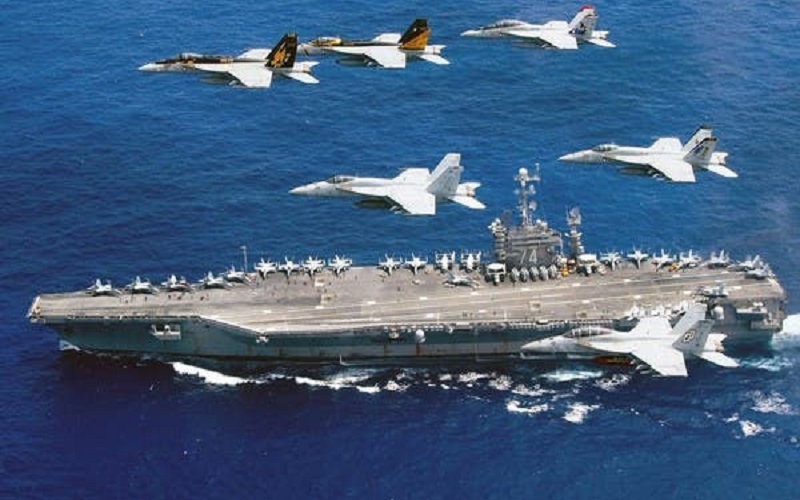“Global Policeman”: Why Is the US in the South China Sea?
MILITARISM, 7 Dec 2020
Andrew Korybko | OneWorld - TRANSCEND Media Service
2 Dec 2020 – The USA regards itself as the “global policeman”, hence its arrogant actions, but it was never deputized by the international community to fulfill such a role. Rather, it’s more like a dangerously delusional role player.
The Philippine National Defense Secretary warned last week that his country “will be involved whether[it] likes it or not” in the event that “a shooting war happens” between China and the US in the South China Sea. Instead of speculating which side of the conflict the Philippines would be on in that scenario, it’s much more relevant to wonder why the US is even in the South China Sea in the first place. After all, it’s USA’ military involvement in this region which is raising the risk of war, not China’s.
The South China Sea isn’t just an historical region of China, but most of it is also a legitimate part of its territory too. The US’ military presence therefore isn’t just on the country’s doorstep, but literally inside its foyer so to speak despite not being invited by Beijing. Washington claims that it’s protecting so-called “freedom of navigation”, but to continue the metaphor, it actually barged into China’s house because of a dispute with some of its neighbors.
The USA regards itself as the “global policeman”, hence its arrogant actions, but it was never deputized by the international community to fulfill such a role. Rather, it’s more like a dangerously delusional role player than a legitimate law enforcement officer. Some of China’s maritime neighbors object to its territorial claims, but these are all bilateral disputes that should be handled between Beijing and each of the relevant parties. The US has no business to involving itself in such issues, but it does so anyhow in order to divide and rule the region.
Much has made in the North American media about China’s activities on various islands, reefs, and shoals, but the fact of the matter is that China has the right to develop its territory however it sees fit. It poses no risk to others, let alone to legitimate freedom of navigation, but it does intend to defend its interests like every country has the right to do. China’s military positioning and maneuvers on and around those pieces of land and their waters actually secure the South China Sea, not destabilize it, unlike the US’ similar actions.
Not once has China ever threatened to impede the free flow of commercial vessels through its maritime territory, but Anglo American officials have publicly spoken about attacking China’s vessels and even cutting them off from the Indian Ocean for example via the Straits of Malacca. The US’ military moves in the South China Sea are an extension of that strategy, intended to bully and intimidate the People’s Republic into submitting to Washington’s foreign policy demands. They’re meant to obstruct China’s freedom of navigation, not facilitate it.
The issue has been discussed so much over the past decade that many folks would be forgiven for falling under the false impression that this has always been a cause of concern. It hasn’t, though, but is only a relatively recent development that first seriously started during the Obama Administration’s so-called “Pivot to Asia”, which was aggressively intensified under current US President Trump. The US even started pressuring its allies to follow in its footsteps and join it in violating China’s maritime territorial sovereignty.
Democrat presidential candidate Biden, who the mass media projected will become the next president-elect despite Trump refusing to concede the race and stop his legal challenges to it, should take the opportunity to reverse this destabilizing policy upon taking office. His nomination of Obama-era and -influenced officials to his administration is worrying, however, since they might simply tweak Trump’s variation of his predecessor’s “Pivot to Asia” instead of reconsidering the wisdom behind it entirely like they arguably should.
In any case, self-regulating and then moderating this policy with respect to the South China Sea — ideally with a view towards eventually reversing it in the interests of regional peace — would nevertheless be an improvement from the status quo if they have the political will to do so. All efforts must be sincerely undertaken by Biden and his team to avoid the dire scenario that the Philippine National Defense Secretary recently warned about. There’s no reason for a war to break out over the South China Sea, but if it does, then it’s entirely the US’ fault.
___________________________________________
 Andrew Korybko is an American Moscow-based political analyst, journalist and a regular contributor to several online journals, as well as a member of the expert council for the Institute of Strategic Studies and Predictions at the People’s Friendship University of Russia. He specializes in Russian affairs and geopolitics, specifically the US strategy in Eurasia.
Andrew Korybko is an American Moscow-based political analyst, journalist and a regular contributor to several online journals, as well as a member of the expert council for the Institute of Strategic Studies and Predictions at the People’s Friendship University of Russia. He specializes in Russian affairs and geopolitics, specifically the US strategy in Eurasia.
Go to Original – oneworld.press
Tags: Anglo America, Arms Industry, Arms Race, Conflict, Geopolitics, Hegemony, History, Human Rights, Imperialism, International Relations, Invasion, Military, Military Industrial Complex, Military Intervention, Military Supremacy, NATO, Occupation, Politics, Power, US Military, USA, Violence, War, War on Terror, West, World
DISCLAIMER: The statements, views and opinions expressed in pieces republished here are solely those of the authors and do not necessarily represent those of TMS. In accordance with title 17 U.S.C. section 107, this material is distributed without profit to those who have expressed a prior interest in receiving the included information for research and educational purposes. TMS has no affiliation whatsoever with the originator of this article nor is TMS endorsed or sponsored by the originator. “GO TO ORIGINAL” links are provided as a convenience to our readers and allow for verification of authenticity. However, as originating pages are often updated by their originating host sites, the versions posted may not match the versions our readers view when clicking the “GO TO ORIGINAL” links. This site contains copyrighted material the use of which has not always been specifically authorized by the copyright owner. We are making such material available in our efforts to advance understanding of environmental, political, human rights, economic, democracy, scientific, and social justice issues, etc. We believe this constitutes a ‘fair use’ of any such copyrighted material as provided for in section 107 of the US Copyright Law. In accordance with Title 17 U.S.C. Section 107, the material on this site is distributed without profit to those who have expressed a prior interest in receiving the included information for research and educational purposes. For more information go to: http://www.law.cornell.edu/uscode/17/107.shtml. If you wish to use copyrighted material from this site for purposes of your own that go beyond ‘fair use’, you must obtain permission from the copyright owner.
